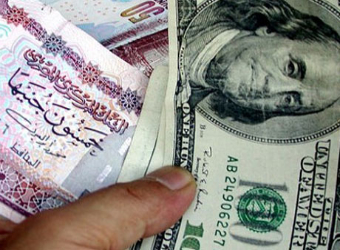The Egyptian pound jumped 1.2 percent on Wednesday at a $1.3-billion foreign currency sale – its biggest ever – as the central bank gambled a large chunk of its reserves to show that Egypt’s economic turbulence was coming to an end.
Since the 2011 popular uprising, foreign reserves have more than halved to less than $20 billion, the budget deficit has widened to 14 percent of gross domestic product and the currency has lost more than 17 percent of its value against the dollar.
The bank has kept the pound rising since the army deposed Islamist President Mohamed Morsi on July 3, thanks to $12 billion in aid from Gulf Arab countries.
It has rationed out dollars in $40 million foreign currency sales three times a week since a run on the pound in December cost more than $2 billion to bring under control.
Despite the sales and a more expensive dollar, businesses have racked up hundreds of millions in unfulfilled requests for foreign currency, forcing them to turn to a black market that has mushroomed in recent months.
“We’re covering all the backlog in the different sectors to help revive business,” a central bank official told Reuters.
“This will definitely have a very positive effect on the industrial side, covering all the needs. So it was a very important move to make,” the official said.
RISING FX RESERVES
The central bank allowed the pound to strengthen to 6.8952 pounds to the dollar at the $1.3 billion sale, up from the cut-off price of 6.9752 pounds at the last regular sale on Monday.
“The central bank is signalling that it believes the crisis is over. Rates are down, reserves are up and now the currency is rising,” Simon Williams, an economist with HSBC, said.
Wednesday’s sale was designed to finance strategic imports such as wheat, meat and cooking oil, the central bank said when it announced the sale on Tuesday, its largest since the $800 million it offered in May.
After the army deposed Morsi, the interim government not only launched a violent crackdown on his Muslim Brotherhood in which hundreds were killed but also imposed a state of emergency and a curfew, which is hurting business.
Analysts say tourists and investors are unlikely to be attracted back to Egypt any time soon, especially if the crisis in Syria intensifies. One currency dealer said the sale could eliminate the black market in dollars for several months.
Continued protests by Islamists calling for Morsi’s reinstatement, as well as militant attacks in the lawless Sinai Peninsula, have also helped to prevent a return to normality.
Propped by the fresh aid from Saudi Arabia, the United Arab Emirates and Kuwait, foreign currency reserves jumped to $18.88 billion in July from a low of $13.51 billion in February, well below the three months of imports – or about $15 billion – that the International Monetary Fund considers to be a safe level.
The Arab aid has also helped the government push down its cost of borrowing, with the yield on 91-day treasury bills falling by almost three percentage points since July 3.
Source: Reuters


